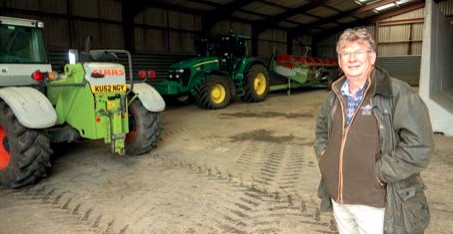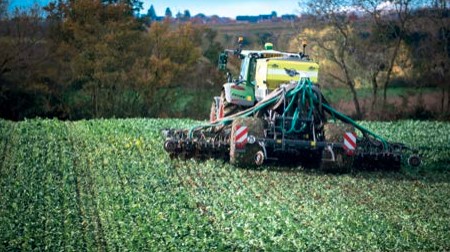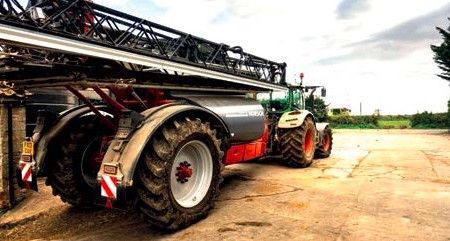One of the many aspirations producers will have when moving to a regenerative farming system is to take a fresh look at both variable costs and fixed costs in connection with their whole farming system.
Written by Nigel Wellings, Director ,Acres Insurance Brokers

I will base my thoughts for this article on combinable cropping farms
For many producers significant cost savings are achieved in terms of variable costs.(seed, fert and sprays) From my own farming experience it was always difficult to get variable costs below the £500/ha mark. Yet I have a number of regenerative farming clients regularly achieving variable costs in the £380- £420/ha range without any significant fall in output.
From a fixed costs point of view labour and machinery are the 2 most significant items and again there is a huge scope for savings here. Gary Markham from Land & Family business quoted fixed costs of £350/ha against £449/ha for conventional farms in his benchmarking survey for No Till Farms in 2019. He concluded that one of the main drivers of profit is machinery costs. Lowering machinery costs especially in terms of self propelled items (tractors, sprayer, combine etc) will have a direct effect on insurance costs. As a general rule something like 50%-66% of Insurance Costs on a conventional farming business will be for the vehicles insured on the farm. Therefore the less horsepower used per hectare generally the lower insurance costs will be.

Benchmarking Insurance costs is fraught with difficulty because included in the majority of farm insurance bills are items such as private cars,houses and house contents and other personal items that do not really relate to the business. There will also be major differences in insurance costs between an owner occupier having to Insure all houses and farm buildings and a tenant who does not have to. Insurance Costs will range between £10ha and £20ha on a larger combinable cropping business. The marginal costs of adding further contract/share farmed land to this will tend to be very low-often around the £1/ha mark.
As an example I have looked at the Insurance costs for 1 combinable cropping farm on 1000ha, both whilst using conventional tillage and since moving to a NO till regime. Under a conventional system the prime movers consisted of an Agco Challenger Crawler at a value of £220 000, Bateman Self Propelled Sprayer at £180 000, Claas Lexion 770 Combine at £230 000 and 3 John Deere tractors at £40 000, £90 000 and £120 000. Total value tied up in self propelled kit is £880 000 (£880/ ha). For Comprehensive insurance on all these items plus implements and trailers the client was paying approx. £7500 per annum (£7.50/ha)
Since moving to No Till the machinery fleet has been drastically altered, Out has gone the Challenger Crawler along with Sumo Trio and Vaderstadt drill,No longer using a self propelled sprayer this has been replaced by a large trailed unit (with no insurance cost because it is automatically insured as an implement). Combine remains as before. Of the 3 John Deere tractors the one at £40,000 remains as a secondary machine and the 2 frontline ones- 250hp and 310 HP have been upgraded so are now insured at £125,000 and £150,000 respectively. Total value tied up in prime movers is now down to £545,000 and from an Insurance costs point of view the premium came down to £4500 in 2020 (£4.50/ha). Overall the total Insurance bill on this farm has moved from £16,500 to around £12,500 (£12.5/ha) since the move to No Till. Other Insurance costs on this farm include 3 cars, 2 pick ups, telehandler, 2 extensive ranges of farm buildings, 4 houses and contents, crop insurance Public Liability, Employers Liability etc.
The particular farm that this example comes from is located in the East Midlands on medium-heavy soils and had already achieved a 20% premium saving when they moved across to Acres Insurance in 2019, having previously been Insured with a major Insurer for decades. The Insurance covers had not been subject to any independent scrutiny in the past and this was reflected in the fact that the farm buildings and 2 of the houses were vastly under-insured prior to moving Insurers. The cost of correcting this was relatively low. Another common problem that we encounter is that many Insurers and their Farm Insurance Advisors do not understand the difference between a Whole Farm Contractor/ Contract Farmer and an Agricultural Contractor.
It is important that this is fully explained and understood by the Insurer. The Contract Farmer carries out all operations from stubble to stubble on the same land year on year, he often also has an interest in the crop. The Agric Contractor does individual operation work , often on a fire brigade basis over a wide geographical area. Insurers claims records will show that claims made by Agric Contractors are generally more regular and more expensive. Hence the fact that premiums for businesses doing more than 50% individual operation work will be around double that of the Contract Farmer/ Own Farmer. We consistently come across farm businesses paying 20-40% more than they should because they have wrongly been bracketed by Insurers as Agric Contractors. Ensure this does not happen to you.

Insurance is an input just like any other therefore it deserves the same scrutiny that you apply to purchasing fertiliser, chemicals etc. There are a number of Independent Brokers throughout the UK specialising in Farm Insurance and capable of delivering good independent advice. When choosing a Broker make sure they are prepared to take the time to fully understand your farming business, its aims and aspirations and that they will look to conduct an annual on farm review with you. Price is important and their can be scope for saving but quality independent advice is just as important.
Savings in Insurance costs are obviously no where near as large as those being achieved in terms of labour and machinery costs with No Till Farming, but they help make another contribution to improving bottom line profit whilst at the same time ensuring you have the optimum Insurance in place is important to protect the business against major liabilities and losses.